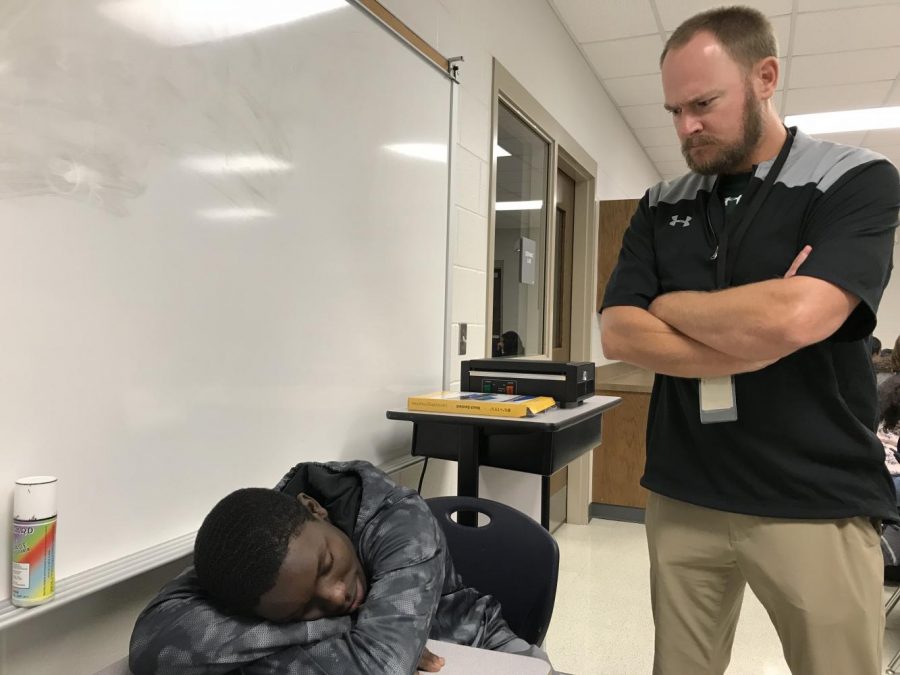Generation Lazy?
Generations such as Baby Boomers, Generation X, and Millennials can add a new member to their ranks called “Generation Z.” These teens and young adults also known as “centennials,” were born between the years 1996-2010. From many of previous generations, the reputation of being a centennial is one of being lazy and irresponsible. A live debate held on Newsbeat, a program from the BBC, sparked the debate: are the Baby Boomers, Gen X’ers and Millennials right, are centennials lazy?
Dylan Craddock, junior, objects to the label. Craddock feels the real reason people feel centennials are lazy is because of preconceived notions found among the older generation.
“It’s my generation, and honestly some of them are lazy, but the majority of them aren’t. It’s just stereotypes and people are not actually seeing the whole picture,” said the 16yr old.
Craddock doesn’t see himself as lazy because of the extracurricular activities that he’s involved with after school and his self-discipline toward academics that exemplifies his work ethic.
“Everyday after school I practice with the band from 2:55pm to 7:00 at night. I’m with JROTC, which takes up a lot of my weekends. The instructors are very hard on us and they push us to do our best and check our grades all the time,” said Craddock.
Senior, Bryan Turner, believes previous generations are convinced that the vast advancements in technology leads to Generation Z being lazy.
“Since they didn’t use technology at our age, they think that we are too reliant on technology,”said Turner.
Possessing the same ideas as Craddock, Turner doesn’t see himself as lazy either. His dedication and the intricate skills he posses for JROTC’s Task Force puts him beyond the category of lazy.

“When there’s a project or PowerPoint I will do it to the best of my ability and I do armed drill,” Turner said.
Turner’s mother was born in 1968, falling under Generation X label. That generation is thought to to be more self-directed and busier than the generation before them. Turner sees these qualities in his mother, however he believes the difference between his mother’s worth ethic and his peers is due to the different points they are each at in life.
“My mom is a college professor and we are high school students. I feel it’s based on both the type of work and age,” said Turner.
Ashley Hicks, Lake Ridge AP Human Geography teacher, sees a contrast from when she was a students herself versus the students that she teaches now. When she was a student, Hicks got her determination from her grandmother.
“My grandmother lived with me and she was like ‘If you’re going to do it you’re going to do it right the first time and not have to go back and fix it. Re-tests for me were never an option,” said Hicks.
A challenge that Hicks still faces today is instilling encouragement to students that don’t have it within themselves and persuading them to want to excel.
“It was hard when I first started teaching because I was so self-motivated that it was hard for me to realize a lot of students aren’t,” Hicks said.
Heather Willson, World History teacher at Lake Ridge, has been teaching for fifteen years. Willson has found many differences between students she used to teach compared to her current students. The main differences are their interests, abilities, and drive to learn.
“When I first started teaching, I would give kids the most boring assignments and they would do it. They wouldn’t question it, they would try, create essays ten pages long, projects taking hours and there was no complaints,” Willson said.
Over the years, Willson has become a more experienced educator and innovated her teaching style based on the evolution of students’ strengths, weaknesses, and preferences. With a few of her current students, Willson finds some struggle with a lack of willpower, which in turn causes her job to be more emotionally involved than academically.
“The difference now, I find even the fun stuff I have to bribe, I have to beg. It doesn’t matter how good I am or how fun I make it, they don’t put forth the same effort,” said Willson.
However Willson doesn’t think the fault lays solely on the centennials shoulder’s.
“I can’t blame that on the kids. It’s a whole systematic process. They’ve had a whole bunch of people in their lives who haven’t expected it of them, they haven’t taught them some of these skills, and I’m just seeing the results of some of this stuff,” Willson said.
Regardless of the stereotypes, there are many Generation Z’ers that are consistently putting their best foot forward and striving to succeed. Every generation has individuals that succeed and fail, when all is said and done, centennials will be no different. Turner feels that his generation has the ability to be successful and prove the doubters wrong.
“The best way to prove we are not lazy is by being innovative, improving on what society has given to us,” said Turner.


